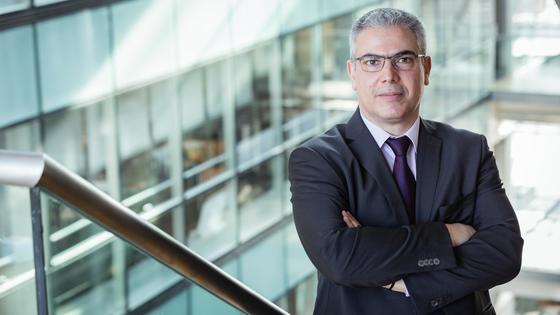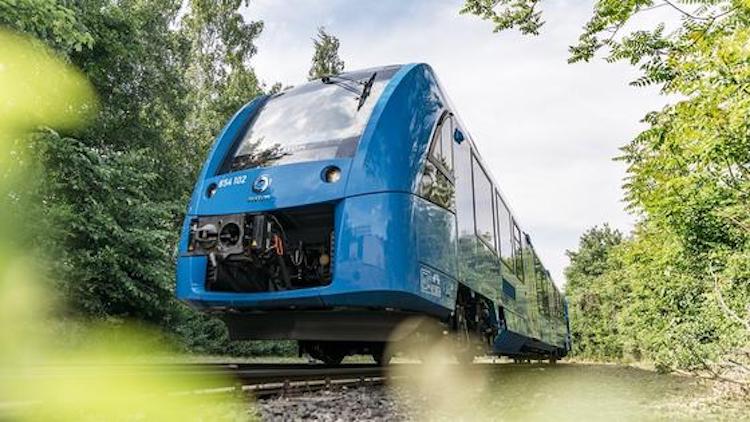In February 2020, Alstom received an order for 11 battery powered regional trains for the Zweckverband Verkehrsverbund Mittelsachsen in Germany.
These are the first battery trains to be ordered from Alstom.
Offering both hydrogen and battery is an important milestone for the Alstom, as it expands its role in the emission-free mobility market.
In this interview, published originally on the company’s website, Brahim Soua, VP regional rolling stock platform, highlights the milestones and the next steps for Alstom’s emission-free solutions.

Question: What are the steps for Alstom towards emission-free solutions?
Brahim Soua: Our focus on sustainable energy has brought green solutions to the forefront of attention. The order from Zweckverband Verkehrsverbund Mittelsachsen (VMS) in Germany is a first for Alstom.
Offering both hydrogen and battery solutions represents an important milestone for the company, as it further proves our central role on the emission-free mobility market.
At the same time, we are already working on bringing our Coradia iLint to different countries: it will for instance be tested in the Netherlands.
This demonstrates that Alstom’s hydrogen technology is fully adaptable to different countries, ready to answer the growing demand for green transportation.
Q: What is Alstom’s experience in using hydrogen and battery?
Soua: We can be very proud to be pioneers in this field. Alstom has two pre-serial trains that are running in commercial service in Germany for more than a year now.
The experience we gained allowed us to offer an optimised full hydrogen system that includes rolling stock, maintenance and hydrogen supply with a partner.
Alstom has signed two contracts for hydrogen fuel cell powered trains.
The first one is for 14 trains in the German region of Lower Saxony. The second one, also in Germany, for 27 trains to the Frankfurt metropolitan area.
Speaking about battery solutions, we already have a great deal of experience with our Coradia iLint.
We’ve tailored the Coradia range to operate with all available emission-free power systems, from electric to battery-electric and hydrogen fuel cells.
The Coradia iLint is powered by fuel cells and offers a performance comparable to a diesel train while emitting nothing but water.
Even though the iLint train is hydrogen-powered, it uses batteries as part of the traction system. Other examples include the Citadis tramway in Nice for example, the locomotive Prima H3 and our electric buses.
Q: What factors are considered when choosing between hydrogen and battery?
Soua: We analyse many parameters, such as operational requirements, existing infrastructure and topography, level of electrification, density of the traffic on the line, level of needed investments and, finally, fleet size.
Generally speaking, battery solutions are more suitable in case of short and medium length of non-electrified sections, while hydrogen solutions are best to use when range is key.
But it is important to keep in mind that these two solutions are complementary, with each of them answering different needs.
Alstom is professional in both, and we are very well prepared to support our customers in choosing which one is the most suitable green solution for them.
Q: What are the challenges that green solutions face today?
Soua: Whenever a green solution is introduced, the full system, including rolling stock, must be optimised. In terms of hydrogen infrastructure, we are talking about fuelling stations and distribution.
Battery solutions, on the other hand, may require charging stations, as well as additional electrification that has an essential impact on cost and on its economic efficiency.
In case of hydrogen technology, in order to make the investment more efficient on the fuelling infrastructure, it can be shared with other forms of transport using hydrogen – buses, trucks and cars, which is called “sector coupling”.
To invest in it, it is also important to gain political support as well as partners to form an ecosystem together.
For the battery technology, we have to tackle the distance limitations. While a hydrogen train can cover 1,000 km without refuelling, battery train range is more limited.
With the new battery technology that we are working on now, it can be increased to over 120 km. However, these numbers are far from being final, as we are constantly learning more and making improvements in this aspect.
Q: What are Alstom’s current objectives regarding the green range of solutions?
Soua: We would like to accompany our clients in phasing out diesel by 2035. Many major companies pledged to become fully emission-free in this timeframe.
Alstom is already ideally positioned, being able to offer the whole range of green-traction solutions to our customers.
Now we continue developing them further, proposing optimal solutions for each customer and each specific case.
In parallel, we are working on improving the environmental impact of Alstom trains that are still using diesel and minimising CO2 emissions.
This can be achieved by using hybrid powerpacks that combine battery and diesel. Other alternative fuels are now also under evaluation.

